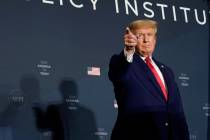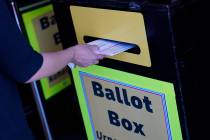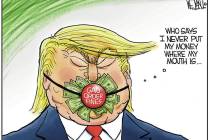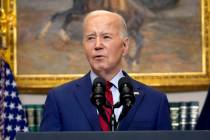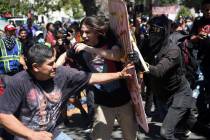Rethinking Vegas
In his keynote address at the Nevada Press Association's annual convention in Winnemucca last weekend, retired state archivist Guy Rocha summed up the current economic crisis with an ominous assertion.
"We are searching for a future," he said.
For decades, Rocha said, Nevada enjoyed being the only place where Americans could gamble without fear that federal agents were going to break down the door and arrest everybody. But with games of chance now legal in 48 states -- and casino-style gambling prevalent across the continent -- gamblers no longer have to journey to the desert for their fix.
"We've gotta find a new horse to ride," Rocha said.
We've been here before, he noted, citing historical examples where the state economy slumped but a new industry was developed to fill the void. The Comstock mining boom put Nevada on the map in the 19th century, but when the mines played out, the state's population plummeted and its economy shriveled. With just 42,000 residents in 1900, Nevada parried with critics who suggested it should be stripped of its statehood.
A new mining boom in Tonopah, Goldfield and Ely revived the state soon after the century's turn, but Nevada dreamed up other revenue sources as well. Boxing, for example. Banned in other states, big-time fights brought thousands of people to Nevada. Between 1897 and 1910, Nevada was the nation's fight capital. But the boxing economy disappeared for decades after other states climbed back in the ring.
Relaxing the divorce laws was the next boon to Nevada's bottom line, but when other states eventually followed suit, Nevada lost its competitive advantage. No-sweat weddings drew eager couples to Las Vegas, but that industry is now in decline as other states are catching on.
Legal gambling turned out to be the state's cash cow for 70 years, but Rocha believes it's time to find our next new angle.
David Schwartz, director of UNLV's Center for Gaming Research, isn't so pessimistic about the future of Nevada's casino industry. But he isn't exactly bullish either. "People have been gambling for a really long time, and they will continue gambling," he says. "But there's a lot of competition that wasn't there before."
Still, finding something completely new to sustain Nevada economically isn't what Schwartz has in mind. Rather, he sees potential in creating new experiences that tourists can't get anywhere else. He mentions as an example "CSI: The Experience," the new interactive attraction at the MGM Grand in which participants help to solve a crime.
On his blog (www.dieiscast.com), Schwartz puts it this way: "Twenty years ago, having a big room full of slot machines with a coffee shop, buffet, steakhouse and lounge was relatively rare -- there was a pretty big novelty factor in Las Vegas. Today, that's just not true."
Schwartz also suspects Nevada could benefit from the legalization of Internet gambling. Consider, he says, the poker explosion of the past few years. Poker was fading in Nevada casinos until Internet poker player Chris Moneymaker came out of nowhere to win the World Series of Poker in 2003. The rise of Internet poker spurred a poker revival in Las Vegas. "There's no thrill that can match playing in the Bellagio poker room, where the biggest names in the game play," Schwartz says.
While Schwartz sees Las Vegas exploiting cultural niches, local economic analyst Jeremy Aguero suggests that the city capitalize on its ability to host large events.
"Southern Nevada has a competitive advantage whenever a group of people converge on a single location for a specific purpose for a limited period of time," says Aguero, principal analyst with Applied Analysis. "Think World Market Center for sports, medicine, entertainment, media, industry or government. [The future] is not going to be about more rooms, it is going to be about building more reasons to fill the rooms we have."
What the perspectives of Rocha, Schwartz and Aguero have in common is diversification -- not necessarily of types of industry but of ways of thinking. Schwartz wants us to think small. Aguero wants us to think big. Rocha wants us to think new.
They're all right. Cleverness is the key to reviving Nevada's economy. Exploiting market niches requires a keen awareness of cultural trends and a willingness to take chances. Creating mega-events requires marketing savvy, proper facilities and community coordination. Building new industries requires political leadership.
It's no secret why the Cleveland Clinic -- perhaps the nation's most respected health care entity -- is investing in downtown Las Vegas. Whatever you think of Mayor Oscar Goodman, there's no one denying his determination to develop downtown in a high-quality way.
The overarching message: Innovate or die.
"The enterprise that does not innovate inevitably ages and declines," the late theorist Peter Drucker said. "And in a period of rapid change such as the present ... the decline will be fast."
Geoff Schumacher (gschumacher@reviewjournal.com) is the Review-Journal's director of community publications. His column appears Friday. Follow him on Twitter at www.twitter.com/geoffschumacher.









